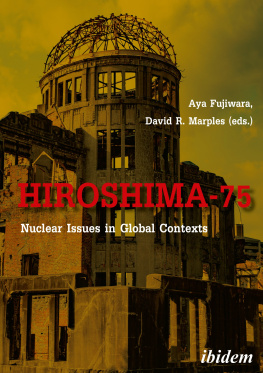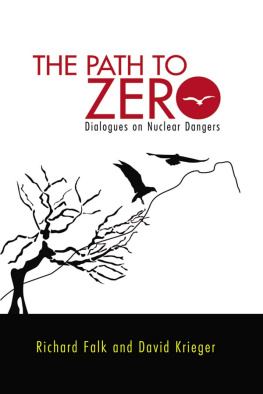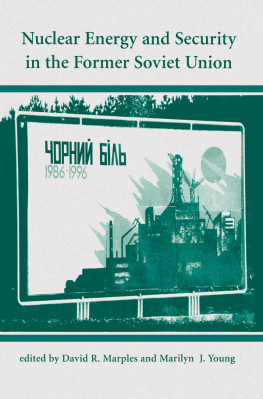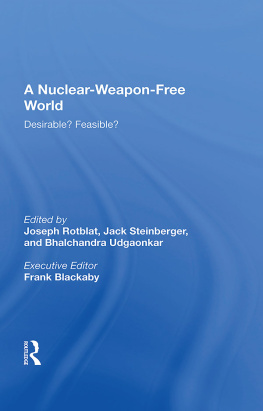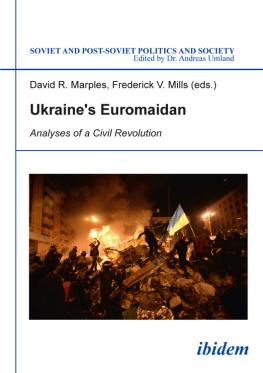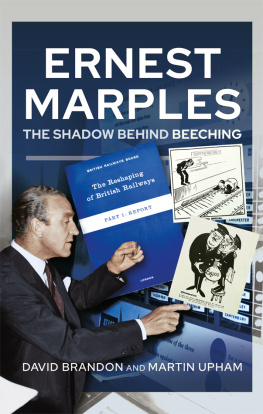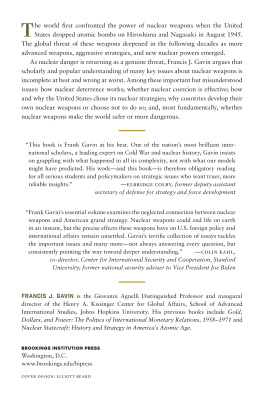INTRODUCTION
Aya Fujiwara and David R. Marples
An international conference took place at the University of Alberta in 2015 to commemorate the 70 th anniversary of the dropping of the atomic bombs in Japan. Since then, selected contributors to the conference revised their essays for publication, reflecting our discussion. The anniversary was a very significant turning point that reminded the world of the catastrophe caused by the harmful use of the atom as a weapon. At the same time, this conference was held during the period in which the Japanese government, led by Prime Minister Sinzo Abe and his Liberal were working to pass the bill to recognize collective defence as a constitutional right. Such a move was controversial as Japans Peace Clause 9 denounced Japans involvement in any military action. Japan saw national protests rising in many parts of Japan in the spring and summer of 2015, mainly initiated by young people. These public demonstrations also embraced anti-nuclear movements that opposed the reoperation of Sendai nuclear plant following its closure after the Fukushima nuclear accident in 2011. This leftist-oriented movement was strongly supported by the opposition to Prime Minister Abe, and developed into an anti-Abe phenomenon. In Canada, Douglas Roche, O.C., a former Senator, MP, Canadian Ambassador for Disarmament, and honorary citizen of Hiroshima, who spoke at the conference, and said, Japan is wasting a great opportunity to become a global leader in creating peace and stopping nuclear proliferation in this world.
In other parts of the world, nuclear proliferation is one of the most preeminent problems, as a nuclear weapon is often used as a tool of diplomacy and military threat. In March 2014, Russian president Vladimir Putin declared that he was prepared to use nuclear weapons had it been necessary during the annexation of Crimea from Ukraine. Similarly, North Korea under leader Kim Jong-un, has conducted many nuclear missile tests and its sixth such test in September 2017 demonstrated that nations capacity to fight against other powers, including the United States.
The atom is also posing many concerns in the era of terrorism and extremism. In reality, nuclear plants, modified, could often contribute to the accumulation of plutonium, increasing a nations capacity to produce nuclear weapons. Nuclear accidents and nuclear weapons, thus, are not separate issues in that both involve imagination and tactics in the use of the atom. Furthermore, nuclear plants could be targets of terrorist activities. In 2015, the US and five European nations concluded the Joint Comprehensive Plan of Action that ended Irans longstanding attempt to put into operation a nuclear power station (Bushehr) based on Russian technology in return for the removal of economic sanctions that the US and EU imposed on this country. Such efforts well reflect concerns about the politically unstable situations in the Middle East, particularly due to the rise of extremist Muslim organizations.
But can we completely remove the atom from the world? Or even from continents? In 1985, Mikhail Gorbachev took over the leadership of the Soviet Union. Among his key stated policies was removing nuclear weapons from the face of the Earth in the year 2000. In his quest to achieve this goal he spoke of our common European home. A year later, after the accident at the Chernobyl nuclear power station in Ukraine, Gorbachev declared (3 May 1986) that the disaster illustrated the wisdom of such a policy. Subsequently, anti-nuclear movements developed around the world, including in the Soviet Union. By the 21 st century, however, with the Soviet Union dissolved, Russia once again placed faith in the atom, as did Ukraine, while Belarus, one of the countries most affected by radiation fallout, embarked on the construction of a Russian-made nuclear power plant on its border with Lithuania. Memories are short, and ultimately economic needs often take precedence over moral stances and long-term safety interests.
Historically, human beings have lived with the atom since its discovery, incorporating, rejecting, and accepting it, and often changing course midstream. Despite its devastating nature or perhaps because of it, this source of energy has not disappeared and will not disappear from the world. As Joy Parr has shown in her study of Canadian nuclear work culture workers at the nuclear plants were often trained to embody the insensible. This argument could be applied to Japan specifically and to the rest of the world, whose history concerned the embodiment of the atom.
The first use of atomic bombs by US planes on the cities of Hiroshima and Nagasaki opened the nuclear era. During the Cold War (194689), the threat of the nuclear war was at its height, peaking with the Cuban Missile Crisis in 1962, shaping the international politics around the atom. North Americans were forced to prepare for the worst and embrace the atom in their everyday lives. Cold War psychology is evident in phrases such as Mutually Assured Destruction (MAD), which came to prominence after the Soviet Union detonated its first atomic bomb in August 1949, and initiated what became a frantic arms race. MAD was based on the premise that the two Super Powers had accumulated enough weaponry to destroy both the attacker and defender; thus, it embraced a form of deterrence based on nuclear strength. In the late 1950s when ballistic missiles were carried by submarines, the concept of MAD no longer applied, but throughout the Cold War, the concept of a first strike held sway in some military circles, i.e. the notion that the enemy could be destroyed before he had an opportunity to retaliate.
By the mid-1980s, the US Strategic Defense Initiative (Star Wars) took the confrontation to potential new levels with the theoretical application of research on an anti-nuclear weapon shield that could protect US territory from a nuclear attack by the Soviet Union. While it was never put into practice, it sparked a dramatic transformation in international relations. Under the new Soviet leader Gorbachev (198591), the USSR initially tried to match Star Wars research, but ultimately chose a path of accommodation with the United States and dismantling medium range nuclear weapons. This process accompanied the opening of Soviet society and the eventual collapse of the Communist regimes of Europe (1989) and of the Soviet Union itself (1991). In turn, however, the Star Wars concept undermined the security of Western Europe, hitherto under the American protective umbrella. Though there were many factors behind the collapse of the Soviet Union, the nuclear arms race was a key one. The end of the Cold War, however, paradoxically destabilized the international system and made it more unpredictable. It left nuclear stockpiles in four newly independent states (Russia, Ukraine, Belarus, and Kazakhstan), and placed the burden of initiating the decommissioning of nuclear weapons predominantly on the United States.

